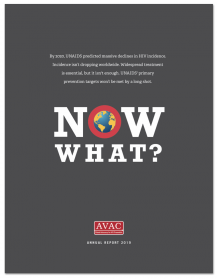The 20th International Conference on AIDS and Sexually Transmitted Infections in Africa (ICASA 2019) is coming right up, December 2-7 in Kigali, Rwanda. Find details below on select events of interest and how to follow the conference. AVAC will be there along with many of our partners participating in sessions both before and during the conference. There are several ways you can link to HIV prevention research and rollout-related events—both in-person and from afar.
For the latest, including a list of poster presentations, visit our ICASA page.
ICASA 2019 HIV Prevention Research Roadmap
Amidst a wide range of topics that will be covered at the conference (full program available here), we have pulled together a roadmap of select sessions that may be of interest to those tracking biomedical prevention research and rollout. And on arrival, be sure to check out the various Networking Zone schedules in the Community Village for more great programming on prevention and more!
Download as a PDF or XLS file and please let us know of any other related events that should be added to the roadmap.
Pre-conferences
Biomedical HIV Prevention Forum Pre-Conference
Monday, December 2, 9:00 – 17:00 at the Kigali Marriott Hotel. Register here.
- The Biomedical HIV Prevention Forum (BHPF)—co-organized by AfNHi (the network of HIV prevention research advocates in Africa) and the New HIV Vaccines and Microbicides Advocacy Society (NHVMAS)—puts HIV prevention research on the spotlight by providing a unique platform where participants gather to learn about progress made and best practices in biomedical HIV prevention research and development. The forum is a space for participants to share HIV prevention research related perspectives and experiences.
Satellite and Special Sessions
PEPFAR Watch
Tuesday, December 3, 8:00 – 11:00. RSVP here.
- Does your country receive PEPFAR funding? PEPFAR’s annual planning process for 2020 is starting now. Join for a skills-building workshop—organized by Health GAP and partners—to find out how to monitor and influence PEPFAR via updates on how activists can ensure money is aligned with community priorities; share experiences and best practices to increase accountability and share tools for organizing and data analysis.
Why Do Pre-Exposure Prophylaxis Costs Differ So Much: Methods or Setting?
Tuesday, December 3, 10:45 – 12:15 in room Jeanne Gapiya (MH4). Register at prep-costing.eventbrite.com.
- This satellite session— co-hosted by the OPTIONS Consortium and Jilinde—will review why cost estimates and cost effectiveness of PrEP can vary so widely within and across programs, countries, and methodological approaches. Hear from a variety of programs and perspectives to identify key drivers of costs and how to make sense of estimates for use in modelling and programming.
Laying the Foundation for an HIV Cure in Africa
Tuesday, December 3, 18:30 – 20:30 in room Joel Nana (AD10).
- This satellite session— organized in partnership with the International AIDS Society, the Bill & Melinda Gates Foundation, Sunnylands, Georgetown University, AVAC, and the Sub-Saharan African Network for TB/HIV Research Excellence (SANTHE)—aims to strengthen engagement and support in the search for an HIV cure and allow delegates to offer important insights on optimizing a future/potential HIV cure.
20 Years After Abuja, What Next?
Wednesday, December 4, 10:45 – 12:15 in room Prof. Madeleine Okome (MH 3)
- This special session—organized by the Society for AIDS in Africa (SAA)—on the Abuja Declaration is a platform to evaluate the impact of various declarations on domestic funding and their implementation in Africa. The Society for AIDS in Africa (SAA) with a group of African and global HIV advocates including AVAC, has developed an African HIV Financing Scorecard in partnership with Accountability International as a means to analyse the existing funding, interrogate the gaps in required funding, and provides evidence-based advocacy messaging for action by the various stakeholders involved. The report will be released during this session and includes recommendations for an African advocacy campaign in the context of broader campaign to increase domestic funding for HIV programming.
ICASA on Social Media: Follow the conference in real-time on social media by following us on Twitter and Facebook—and using the official conference hashtag #ICASA2019.
